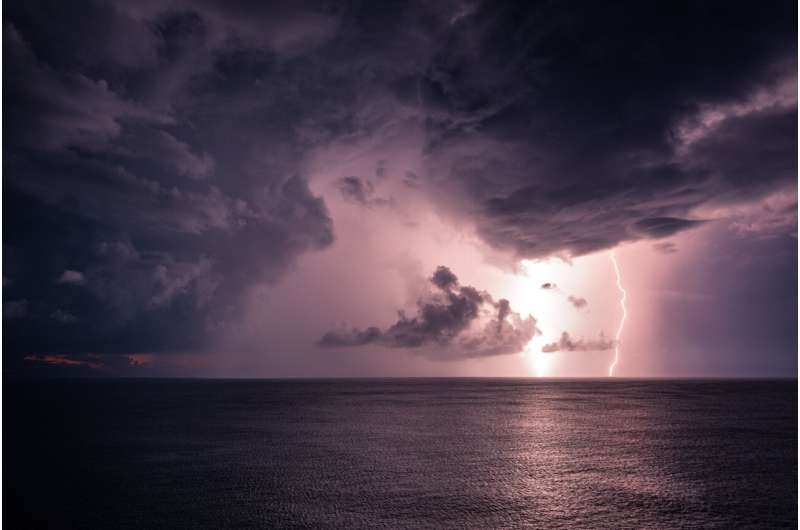August 3, 2022 report
Salt in sea spray found to be the reason for less lightning over tropical oceans

An international team of researchers has uncovered the reason that less lightning occurs over tropical oceans than over land. In their paper published in the journal Nature Communications, the group describes their multi-year study of atmospheric conditions over the oceans bordering Africa and what it showed about salt in sea spray and its impact on lightning.
Scientists and mariners have known for a long time that lightning is less common over the ocean than it is over land—but the reason has not been clear. To find the answer, the researchers obtained atmospheric data for Africa and the oceans around it for the five-year period 2013 to 2017. The data included numbers of lightning flashes, rainfall, temperatures and cloud representations. They looked for differences in atmospheric conditions in storms that occurred over land versus those that occurred over the sea and found one main difference: the amount of salt in the air.
Lightning is produced when upwardly moving air in clouds forms ice crystals—aerosol particles then begin to bump into one another, creating an electrical charge. Lightening happens when the electrical field in one part of the cloud becomes positively charged (usually at the top of the cloud) and another negatively charged (usually at the bottom of the cloud). And clouds form, of course, when moisture evaporates from the surface of the Earth and the water drops bond with aerosols.
The researchers found that things are slightly different over the ocean. When water evaporates from the sea, it bears a load of salt. When the salt water bonds with aerosols to form water droplets, they tend to be bigger and heavier than those that form over land due to the salt—and that results in more of the water in the clouds falling as rain before it can rise up and form ice crystals. The result is far fewer lightning discharges.
The researchers suggest their findings could be useful in improving the accuracy of both climate models and meteorological reports. It could also conceivably lead some to attempt to seed storm clouds with salt to reduce their severity.
More information: Zengxin Pan et al, Coarse sea spray inhibits lightning, Nature Communications (2022). DOI: 10.1038/s41467-022-31714-5
Journal information: Nature Communications
© 2022 Science X Network



















